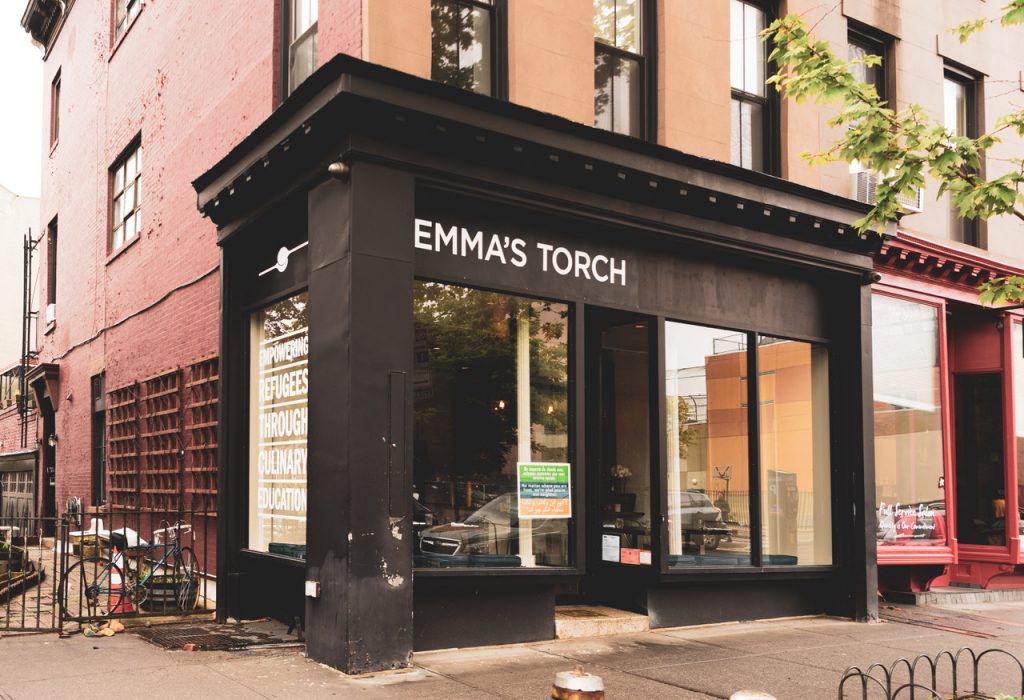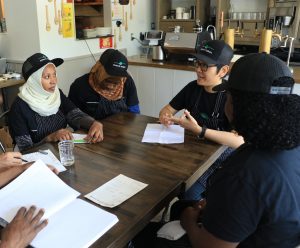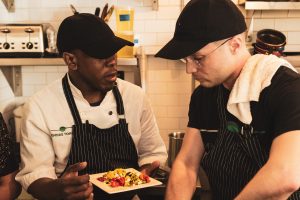We all respond differently to people in need and the opportunity to help. For Kerry Brodie, it meant changing careers to create a culinary training program for refugees to help them find meaningful employment.
With a passion for food, Kerry headed to New York and attended culinary school, while considering her new idea to launch a non-profit. New York, she says, was the perfect city to launch a non-profit focused on helping refugees find meaningful work. The city has a rich history of welcoming immigrants and a thriving restaurant scene, one that is constantly struggling to find cooking talent.
Freedom through employment
In June 2016, Brodie combined her love of cooking with her advocacy for refugee and human rights to launch the non-profit, social enterprise Emma’s Torch. Emma’s Torch is named after Emma Lazarus, a refugee right’s pioneer whose inspiring words are found on the base of the Statue of Liberty: “Give me your tired, your poor, your huddled masses yearning to breathe free.”

In an eight-week, paid apprenticeship program,students receive over 400 hours of culinary training and licensing. They gain work experience at Emma’s Torch Restaurant in Carroll Gardens, Brooklyn and participate in accelerated English classes focused on restaurant industry vocabulary. The training is focused and personalized, with one instructor for every two students. The curriculum is designed in consultation with the program’s Chef’s Council, made up of a wide range of New York restaurant experts.
The restaurant is open to the public for weeknight dinner and weekend brunch. The students operate the kitchen with Culinary Director and Instructor, Alex Harris. The model gives students focused training, as well as the practical experience of working in a high pressure New York restaurant.
Students master all of the critical skills needed to work in a restaurant kitchen. Upon graduation, they are instantly employable. And employed they are. The first three cohorts (twelve students in each) have completed the program and currently work in restaurants across New York City.
A lean start-up approach
The road to Emma’s Torch was well researched, collaborative and ambitious. Brodie sought to answer the question: with 8 weeks of training could a refugee become just as qualified as a Culinary Institute graduate? She did her research and networking over many months, meeting with human resource teams, chefs and culinary leaders to ensure that Emma’s Torch curriculum met the needs of the culinary industry. The answer turned out to be yes.
Launching the project was not without its own challenges: lack of experience in the field, and being young, confronted Brodie as she began the project. She knew the idea was sound, but started with a small pilot project to test the approach, before building an entire non-profit and investing in a cafe. The small pilot not only confirmed that her idea could work, it was an important step in demonstrating the value and return on investment for the foundations and donors that support Emma’s Torch.

Brodie provides post-employment supports for her students, working with the employing restaurants as needed. Emma’s Torch also partners with resettlement and advocacy organizations. They help refer potential students and are available to support the students if needed during their training.
This lean start-up approach – “try, learn, adjust, try” – is not entirely common to non-profit culture. Brodie shows how it can work effectively to support refugees. Her research, industry connections and commitment to provide meaningful training-to-work opportunities results in an environment where students are set up for success. The employment success of each student is a testament to the quality of his or her training and thoughtfulness of Brodie’s approach.
With a great launch and solid industry connections, in May 2018 Brodie and the team moved from their brunch pop-up in Red Hook to a fully operational restaurant in Carroll Gardens and ramped up operations to graduate at least 40 students a year.
Success means changing lives
As Emma’s Torch builds to have an impact on meeting New York’s restaurant industry labour demands, the impact on refugees is immediate.
The only constant for refugees is change. When they start to settle, there are many firsts. Their lives are precarious, sometimes living in homeless shelters. Employment brings stability. After training at Emma’s Torch, students are moving out of homeless shelters into more stable housing. Some graduates have gotten promotions already in their restaurants.
Employment means decreased isolation, as they make connections with co-workers and build their social networks. One graduate is now able to save money to take night courses, building new hopes and dreams that seemed beyond her when she first started the program. Brodie says it’s exciting to hear them talk about their future like anyone else does, with joy and ambition.

The future for Emma’s Torch is growth and replication. Brodie sees the program being easily replicated in other cities in the near future. Like Gijs Corstens of Hack Your Future, Brodie says it is important to help refugees build skills to lead to long term employment. She’s not interested in tokenizing refugees, asking, “we love to have a meal cooked for us by a refugee, but how do we ensure that they have a sustainable salary?” She says it’s important to think through how can you be sure of the long-term impact you can have.
Emma’s Torch is building new careers, transforming the lives of refugees and meeting local labour market demand. There’s no doubt the next moves for Emma’s Torch will be well thought out and planned with the most impact possible on refugees and their communities. Emma Lazarus would be proud.
Tips for employers:
- Passion and a desire to help can overcome lack of experience when building a new social enterprise. Being ambitious is as important as being collaborative when building a new idea.
- Start small, learn from your experiment. Brodie took a small idea, tested it and refined it before investing deeply. When it was ready, others were ready to invest in it as well.
- Build relationships. Having a market for your clients is essential to their long term success. Those partners will also help to ensure that your program meets their needs, and you’ll become an important part of their HR supply chain.
- Supports for your clients are essential. Paid internships or work placements are desirable, to show both your clients and partners that the venture is serious about making change in the lives of refugees.
